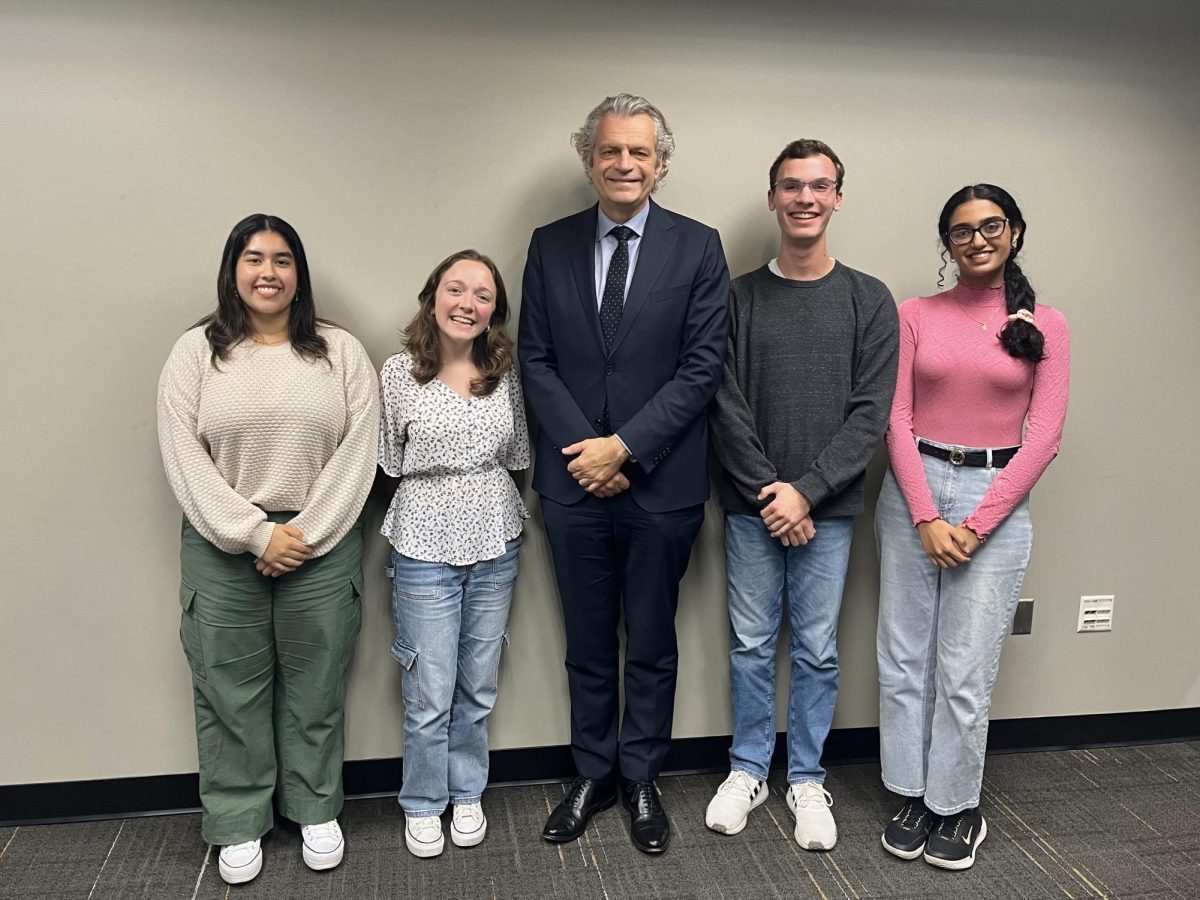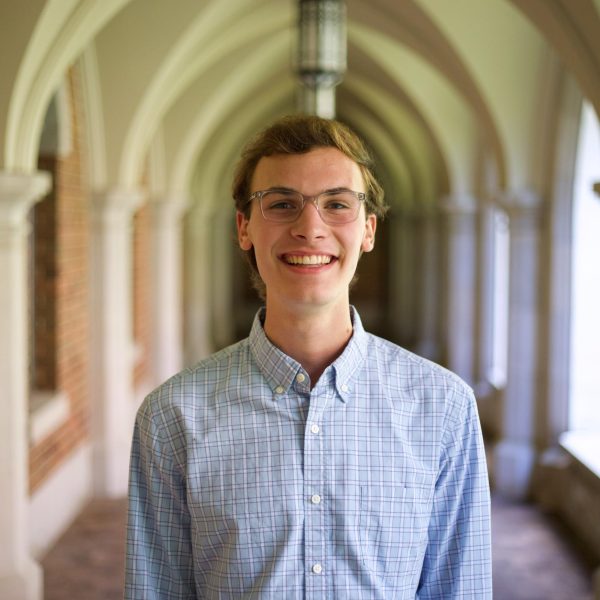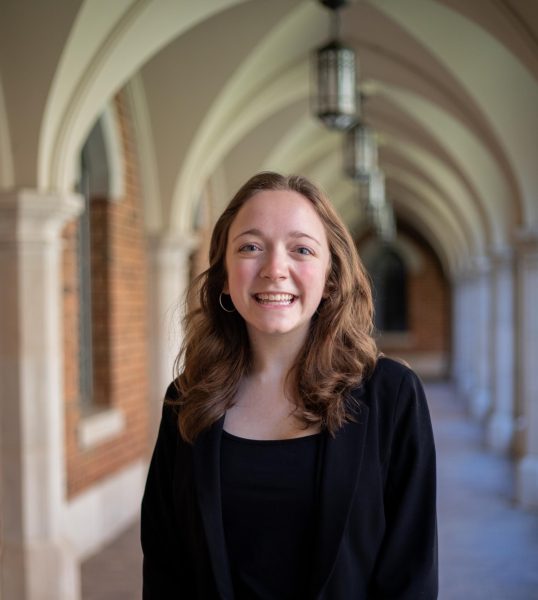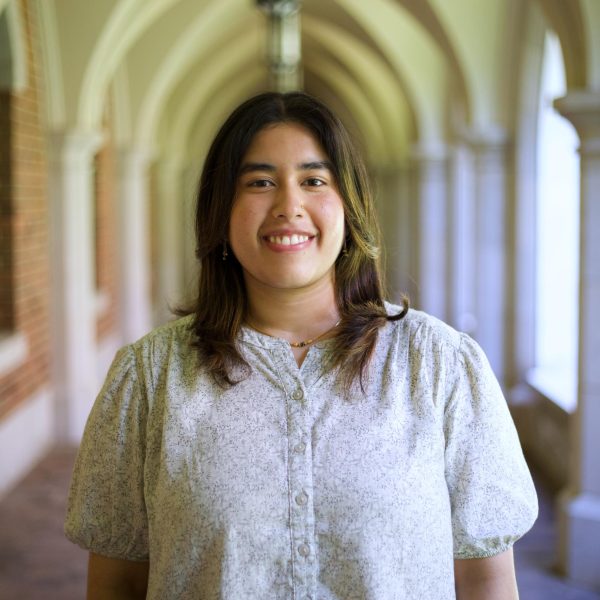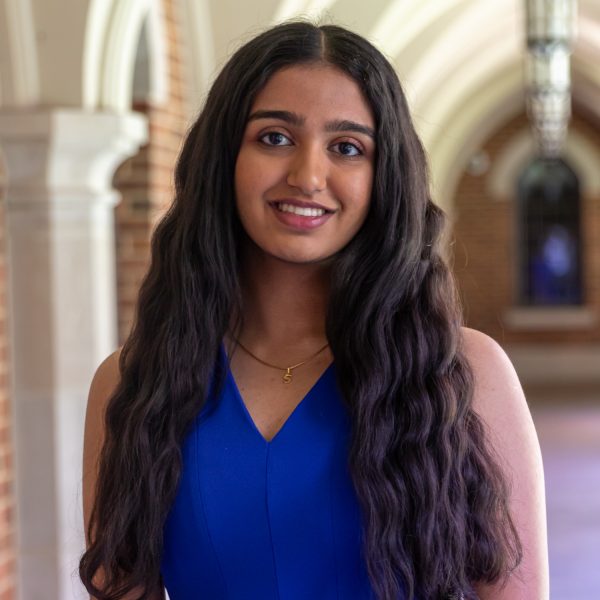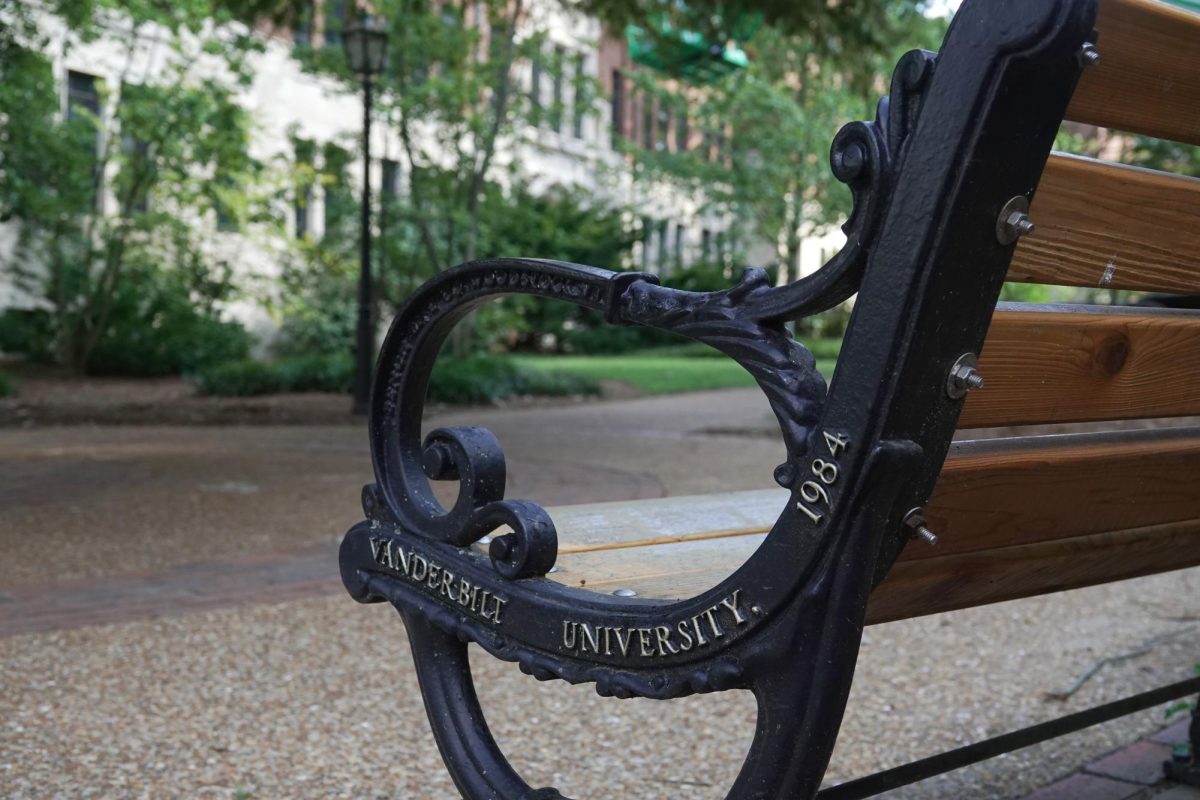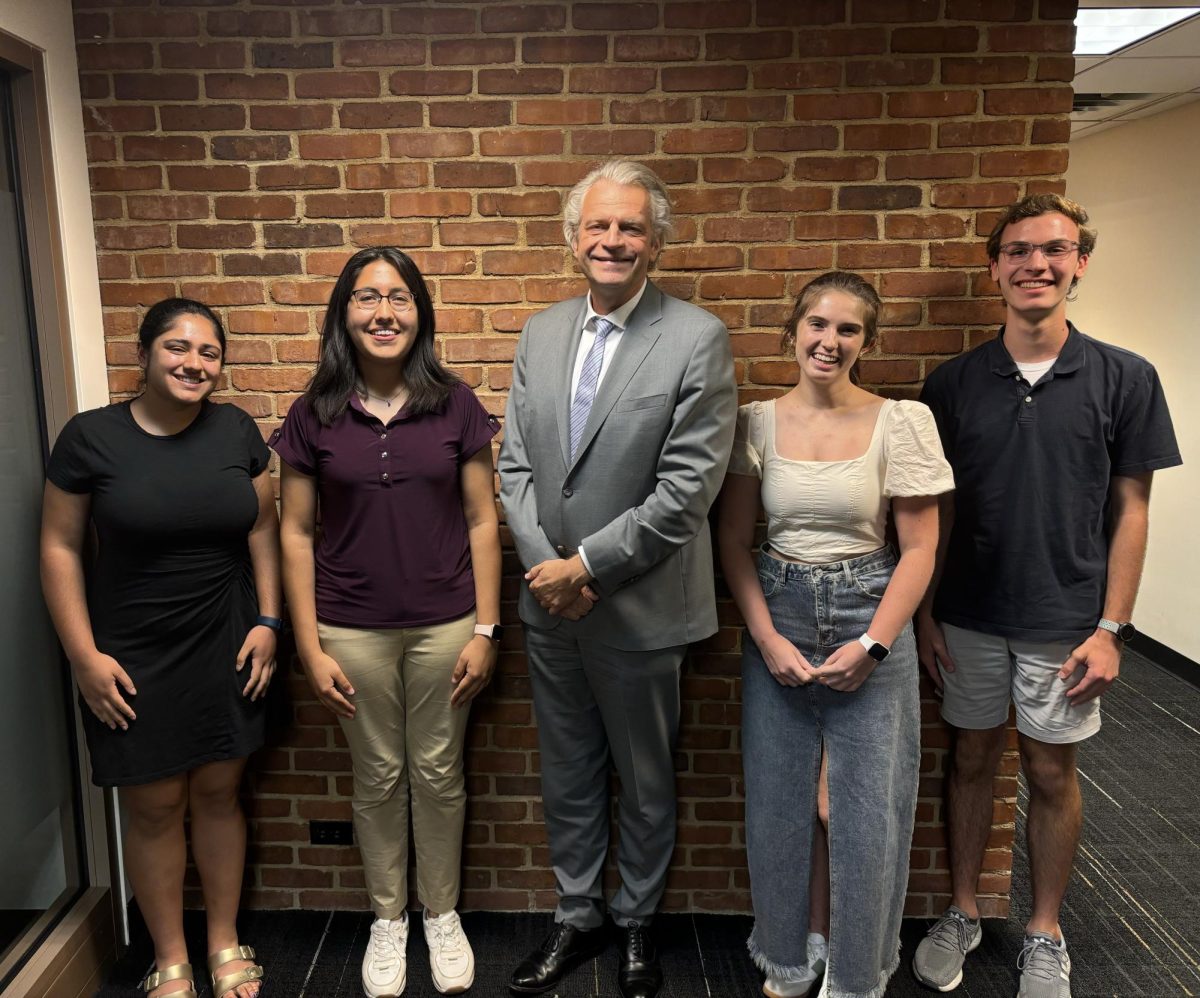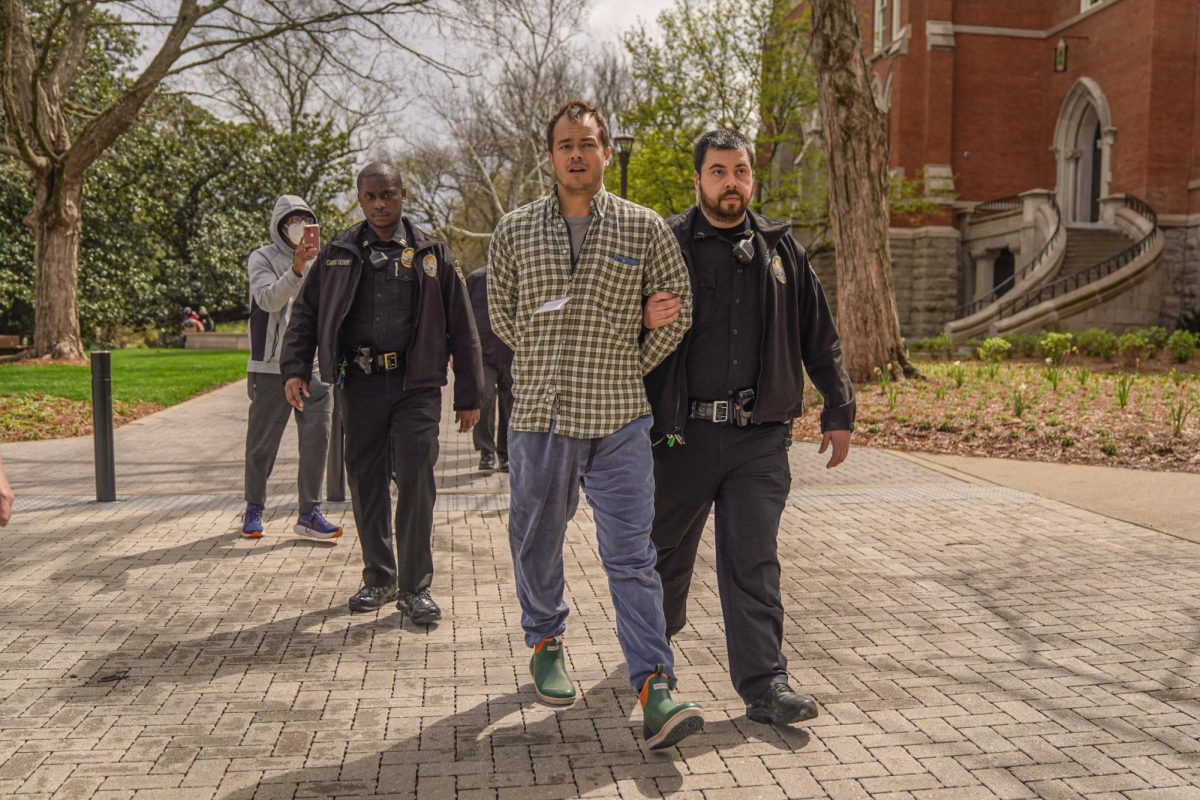The Hustler sat down with Chancellor Daniel Diermeier for our last debrief of 2024. He discussed retaining diversity in the admissions process after the Supreme Court banned affirmative action and reflected on the past three semesters of Dialogue Vanderbilt programming and speakers brought to campus.
He also spoke about construction on campus, the expansion of campus in Nashville and around the country and graduate student unionization.
Diversity in admissions
The Hustler: The Hustler recently found that the proportion of students of color among the Class of 2028 decreased 21% as compared to the Class of 2027. How would you explain this drop in acceptance for students of color, and do you see this becoming a trend with the Supreme Court ban of affirmative action?
Diermeier: I think it’s very early to say. This is the first time now where we’re looking at admissions after the Supreme Court decision, and there were a whole bunch of things going on at the same time. For example, our students with Pell Grants went up. I think we now have 23% or something with Pell Grants, and the proportion of first generation students went up, so I think we’ll have to see exactly how this works after a couple of years. It’s very difficult to see after one year. Admissions is always a combination of who applies and who you take and all of that.
What we’re looking at when we do admissions is a holistic admissions process, and that includes a whole variety of different factors. After the Supreme Court decision, anything that is race conscious can no longer be part of the admissions process, but we have a variety of initiatives, including our partnership with Metro schools, where we really want to make sure that Vanderbilt is accessible to a variety of different students. We really like where we are in terms of the admissions process at this point. It’s way too early to tell exactly what it’s going to look like this year, but Vanderbilt is an even stronger destination for the most talented students in the country. We just have to see what specific strategies we’re going to pursue in the future.
In addition to a new supplemental essay prompt, is the university making any other changes to its admissions process to retain diversity among the student body within incoming classes?
I don’t think there’s anything on the table at this point. I think the key is to be very intentional in making sure that we’re reaching out to various different student segments. What you learn in admissions is that every student segment requires their own outreach strategy. For example, we’re co-leading an initiative now for rural students — the STARS [Small Town and Rural Students] initiative. Rural students are significantly underrepresented among highly selective universities, and [reaching these students] requires a different approach than if you, for example, are looking for Hispanic students, because everyone has their own context. You want to be very intentional about that.
There’s not going to be one thing we’re going to do — there are going to be 10 things we’re going to do. And the goal is always the same — making sure that the students, no matter what their background [or] their context is, see Vanderbilt as a place — as their top choice — where they feel that they can thrive.
This [includes] a very important financial aid commitment — Opportunity Vanderbilt — which when you look at it, you put it into a broader context. If you are admitted to Vanderbilt, you will not pay any tuition with an income of $150,000, and that’s 4/5 of all American families. That’s a huge commitment. And of course, we have financial aid for higher income groups as well. But then there are [also] non-financial barriers to access. Sometimes people may not know about Vanderbilt or they may not think it’s a great place for them. They may be the first in their family to go to college. All these types of things are very specific to the particular student segment, and what we want to do is that we want to be intentional about having strategies and approaches for each one.
Speakers on campus
We were very privileged to have both Nancy Pelosi and Mitch McConnell as guests in the U.S. Elections class. Students have noted that you were present to introduce McConnell but not Pelosi. Is there any reason for the McConnell event being much larger, both with you presenting and the presence of other notable politicians at that event?
Whenever we have dignitaries and leaders of this caliber [on campus], such as Speaker Pelosi or Senator McConnell, I want to be there and give words of welcome. The challenge, sometimes, especially for this class [which] is scheduled a bit later, has to do with arranging schedules and so forth. Whenever I’m available [or] whenever I’m here, I love to do that, and it’s important that I do that. For the case of Speaker Pelosi, there was a scheduling conflict, but I had a wonderful conversation with her later, and I think she had a terrific visit on campus. She was very impressed by the students, and, from what I’ve heard, the class was great with lots of insights, and she could have gone another hour.
Since Dialogue Vanderbilt started in Fall 2023, how do you feel about the progression of the program? Have there been any memorable moments or events that you particularly enjoyed?
We’ve had this long commitment to free expression and civil discourse on campus, and there were a variety of different initiatives. What Dialogue Vanderbilt did is coordinate all of them, and then we doubled down. We did even more, particularly with respect to student programming. That has really worked well. My sense is that when I talk to students now, they really feel part of this. The values and the particular way to interact with each other is becoming part of our student culture — even more than it was before — so that’s wonderful to see.
There are two moments where this was really important to me. The first one was when we had the discussion with the incoming first-years in Langford Auditorium, moderated by The Hustler Editor[-in-Chief]. It gave me an opportunity to have dialogue with all the incoming students. The questions that they had — how does that work and why are you doing it this way [and] not that way — could be addressed.
The second thing was on the Monday before the election, I went to a debate between the [Vanderbilt] College Republicans and [the Vanderbilt] College Democrats, which was co-sponsored by Dialogue Vanderbilt. I said a few words there. First of all, it is no longer a given that College Democrats and College Republicans participate in the same event on campus, which I find deeply distressing. This was an example where I think our students really stepped up. It was a terrific debate. There were lots of students there. It tackled some challenging issues [like] immigration, abortion and the size of the federal government. It was respectful, it was thoughtful and people were well prepared. It was a seriously wonderful model of how we think about civil discourse.
It doesn’t mean we have to all agree, but we want to make sure that we treat each other with respect, and we use arguments in order to convince each other. But even if that’s not the case, we understand our own position and own values better because we’ve had an opportunity to discuss it in exchange. [It was a] wonderful example of what makes this program and our student body really stand out among universities right now.
Looking back at the past three semesters of Dialogue Vanderbilt programming, what do you think are some areas for improvement within the program?
We have a huge amount of speakers right now. There’s very strong student participation. I try to go to as many [events] as I can. Whenever I’m participating, I see the engagement from the students. I think that’s great. I think we need to make sure that we’re current and that the issues that are top [concerns] of students, the country and globally are part of the valuable experience. Right at the eve of what [is an] enormously consequential election in our history, to have the former Speaker of the House and the former Senate Majority Leader is a terrific opportunity. Those are the types of issues that we want to be able to talk about. The critical thing is to make sure we have access to great outside speakers and continue to be innovative in our programming. When there are new ideas, we can try them out and see how we can do even more and even better.
Since Dialogue Vanderbilt is not run by a specific student organization, what is the university’s process for choosing and vetting Dialogue Vanderbilt speakers?
Students can bring in speakers as well. This is important that we have a process for this which goes back over 50 years now, where registered student organizations or faculty can bring speakers to campus, and they do. That’s their decision, who they bring to campus — not everybody agrees with that. There are speakers that people strongly disagree with, but that is a fundamental Vanderbilt value. This goes all the way back to the late 60s when the Student Impact Symposia, which was student led, brought speakers that were very controversial at the time — like Strom Thurmond and Stokely Carmichael — to campus. This created a lot of controversy, but we trust our students that they do that, so we are very comfortable with that.
We think that this is an important part of Vanderbilt’s tradition and its values, and we don’t want to change that. And then other speaker series [such as] the Unity Project are bringing people in. The Divinity School may bring people in. So there’s just a whole variety of different things. What we want to make sure of is that we provide opportunities for different members of our community to bring people on campus, and that’s what we’re doing.
What does the process look like for bringing a speaker for Dialogue Vanderbilt when it’s not associated with something like a student organization or the Unity Project?
Dialogue Vanderbilt is really an umbrella organization. When we have, let’s say, the class on elections, they may have an idea of who they want to bring in, and then we facilitate or co-sponsor that. Then, some events are Dialogue Vanderbilt-sponsored, and there are a couple of faculty who are a part of that, a couple of members of the administration who work together to bring speakers to campus.
How do the speakers that are brought to campus and the opinions they share align with the policy of institutional neutrality when it is administrative faculty who choose to bring particular speakers to campus?
As I said, there’s a decentralized process too. I think it’s important that when you think about bringing speakers to campus, it’s really not about position taking for us. That is really about free expression, and the value of institutional neutrality is not touched by that because we’re not endorsing the position of any one of the speakers. The speakers come here to speak for themselves. Whether Senator McConnell or Speaker Pelosi say something, that’s not our position. That’s their position.
So then the question is what are the processes to bring different voices to campus, and that is really an open forum. And our view on that is the more the merrier. The more speakers we can bring on campus, the better. We’re not endorsing the position of one speaker or another. All we do is that whether student groups or faculty in their classes or somebody in the Divinity School or the Law School or the law societies, we say whatever you want to do, go ahead. Our job is to facilitate that. The goal is to bring many voices to campus, let students go there, listen to what they have to say, agree or disagree, ask questions and form their own opinion.
Yascha Mounk recently spoke at a Dialogue Vanderbilt event, and students expressed concern about his presence on campus given the rape allegations against him. How did the process you just described apply in this case?
I don’t know much about the specifics of this, but my understanding is that there was an investigation that Johns Hopkins [University] did, and that’s their investigation. We don’t really have a point of view on that at this point. I don’t know where that stands, whether that’s concluded or not, but unless there is a particular allegation against a member of our community or because of misconduct — could be by a third party too, by an outside person — we don’t have the ability to do our own investigations along those lines.
Do you think there should be protocol regarding rescinding invitations to speak on campus if allegations such as those against Mounk surface?
Rescinding an invitation is a big step. There’s a difference between an allegation and a finding, and we at Vanderbilt and at most other universities have a very detailed process for this. It’s important that we let these processes run and that we do not take very consequential decisions, which this one would be based on allegations alone as important. If [Johns] Hopkins, or wherever the relevant institution, had taken a particular action on their own, we would have had a conversation with that. Just the fact that there is an allegation would trigger a process which would not mean a finding right away. That’s the way we handle it internally, and I think that’s the appropriate way to handle these types of things because fair process is an important thing for everybody.
Campus construction
With the announcement of the demolition of Branscomb and McTyeire and the construction of four new residential colleges, many students have expressed concerns that there will be less available housing for students in the next couple of years. Since the housing process is already competitive in nature, how do you see this construction affecting students’ abilities to get the housing they prefer as they wait for these new buildings to be completed?
Whatever we do with housing and the residential colleges is driven by our commitment to have the best possible learning environment for our students. What we have learned over the last [few] years is that we love the way freshman Commons is working. I think it’s arguably the best first-year experience in the country, and we have had very good experiences with the residential colleges. We added another one just this year with Carmichael College. We want to make sure that all of our students have the ability, when they become juniors and seniors, to live in residential colleges. We don’t have that right now. We only have a fraction of that. We know students [say they are] the most desirable places to be. We know when you look at how students respond to [them] that they’re very popular.
So, our decision is a significant, massive investment in our students and the residential colleges. We want to make sure that this opportunity is there for everyone. That means there’s going to be a period when we’re going to build these things, and during this period, we will do absolutely everything possible to be as supportive of the housing needs of our students. It will mean that there will be more opportunities to live [off] campus for a short time. That’s unavoidable, but the housing office is working very hard to make sure that this can be done as smoothly as it is.
Since there will be almost 800 fewer beds on campus after the demolition of Branscomb and McTyeire, more students will have to live off campus. What will happen if not enough students apply to live off campus?
I don’t know. I would have to discuss this with the Dean of Students to [find out] exactly how they’re handling this right now. I would be happy to get back to you on that, but I don’t know exactly what their plans are.
Campus expansion
In addition to construction on campus, the university has been involved in off campus property acquisitions including the recent $66.9 million purchase of property along West End Avenue. What is the purpose of these off campus property acquisitions?
There is a general answer, and then there’s a more specific answer. The general answer is universities grow, so a successful university is a growing university. We will always do history, but a few years ago we didn’t do neuroscience. Now we’re doing neuroscience. A couple years ago, we thought the possibility for [artificial intelligence] was long, long in the future, but no, that’s a big thing. We’re doing an investment in the College for Connected Computing.
So, whenever we have an opportunity to acquire land that is contiguous to the university or close to the university, that’s a wonderful investment. It may not be anything realized in the next two to three years, but it ensures that the university can grow and has the ability to grow for the next 50, 100 years. Universities that are landlocked do not have the ability to grow. This is a very, very painful process, a very difficult process, so we don’t want that. We have the additional challenge that we are in an urban environment, so it’s usually more difficult to grow in an urban environment.
Because of very prudent land acquisition strategies that my predecessors started and that I want to continue, when we have an opportunity to have property at market value — we don’t want to overpay either — close to the university, we will take advantage of that. There are specifically things we are thinking about in terms of what we want to do in innovation and in the sciences. A lot of these things are not fully formulated yet, but it basically provides options for us, and that’s why we like it.
To clarify, the plan for these off campus properties that are contiguous to campus is potentially to develop them into campus land?
It’s just an option at this point. It could be all sorts of things. For example, a few years ago we developed graduate student housing. It could have all sorts of purposes. Right now, the goal is just to maximize our options. Whenever we have an opportunity to do that, particularly if it’s an attractive property and there are already businesses on it so it generates some revenue, from a financial point of view, it’s a very advantageous thing to do. Whenever we do this right now, we’re maintaining optionality. That’s the goal, and it could also turn into all sorts of things.
In looking at some of the university’s property holdings, we noticed that the university owns a penthouse suite in an apartment complex near campus. Do you know what that is used for?
You may know that we had a chancellor’s residence about half an hour from here in Belle Meade that we sold a few years ago. This is used as a temporary residence until we make a decision about what we want to do with a chancellor’s residence at some point.
So that’s where you’re living at the moment?
That’s where I’m living, and that’s going to take a while until that’s clear. It’s not an ideal setting, but it’s okay. We felt that the original chancellor’s residence was too far and with traffic was almost half an hour and needed a lot of work, so it just wasn’t a good idea. I like to be closer to campus. As I said before, I think living on campus, being part of the residential community on campus, is an important thing.
A lot of things have to be decided first before we could go with one [location]. Whenever you do campus planning, it’s kind of like dominos. First you do this, then you decide that, then you can decide this. But then sometimes, in order to decide that, you first have to decide something else. That’s why these things take years.
Vanderbilt is also expanding into New York City’s Chelsea neighborhood and West Palm Beach, Florida. Could you explain the choice to create satellite campuses in these areas rather than in Tennessee first?
We’ve been thinking about these as second campuses. Both will be full-fledged campuses of different sizes. The fundamental premise behind these acquisitions is the following: We believe that successful universities can have a great symbiotic relationship with their community. We know that’s possible in Nashville. We know it from a variety of other universities, and there is also a lot of empirical evidence on that. The key is that you then need to have a good match between the university, your aspirations and the community. For example, if you want to start a film school, it is better to do it in Los Angeles or New York instead of northern Idaho. This doesn’t mean there is anything wrong with northern Idaho, but to have a great film school, you want to be part of an ecosystem that supports careers, opportunities, internships, guest speakers and other things that are so important to hav[ing] a vibrant university, particularly a professional school.
In Nashville, we have great assets of that sort; We, of course, have music and entertainment, and we are the healthcare management capital of the country — there’s tremendous growth on that. We are also doing great on transportation, but [there are] areas where we’re not as strong. [For example], we’re not as strong in international finance. We have some companies in that space, but [Nashville] is not a financial capital in the United States. There is some work that is not on the same scale as in New York, such as the visual arts, design or international policy. For students that want to have [those subjects] as part of their [educational] path, it creates tremendous opportunities for us to be in New York.
The New York campus is a fairly small campus. It’s a beautiful campus right in Chelsea, a fantastic location. It looks like you took a piece of Vanderbilt and you moved it to Chelsea — beautiful trees, beautiful old houses and a beautiful park. You’re [within] walking distance of the tech sector in New York, which we don’t have a huge amount of in Nashville. Then there’s [the] arts, fashion, finance and global policy — think about the United Nations and so forth — that’s right there. These are the opportunities we want to offer our faculty and our students. We also think it’d be a great thing for the Divinity School or the Blair School in continuing education. There’s a whole bunch of things for which this will be a fantastic environment.
[The idea for] West Palm Beach is very different. West Palm Beach is going to be focused on business, finance, AI, data science and innovation. Mostly graduate students, professional students and PhD students [will study here]. Why? Because this area of the country is becoming the second financial center, and it is the gateway to Latin America. There is a global dimension to both of these places — New York and Miami — and that is great to have for our students and faculty. Nashville has many wonderful features, but it’s not the gateway to Latin America, and many students have an interest in that. [Miami] is also a coastal city, so specific issues such as climate resilience could be something we can expand on. The real draw right now is the location — the fact that it has a global flavor with respect to Latin America and the fact that its nickname is the “Wall Street of the South” because there are so many asset management firms and investment banks [that] have either relocated there or created second offices.
Undergraduates can spend some time there — think about it as studying “abroad” in New York or Florida — or [get] short-term certificates. Career opportunities [are also] an important part. If we’re members of the community there, it opens a door on the career side, whether that’s in the arts or finance.
Can you explain the “second campus” concept a little bit more? Will there be programs specifically housed in those cities such that if you apply to Vanderbilt for that program you wouldn’t be on the Nashville campus at all?
We don’t think so. It may be for some master’s programs. Because they’re much shorter, that’s possible, but not for undergraduates. For undergraduates, we really want to think about the Vanderbilt community, which is hugely important for undergraduates. It’s kind of like a study abroad concept, spending some extended time in another location, but we always want undergraduates to spend a significant part of their education and be fully part of the community.
Graduate student unionization
The university recently filed a restraining order against the National Labor Relations Board for FERPA violations. What was the reasoning behind this lawsuit? How do you see this affecting graduate students’ attempts to unionize?
This lawsuit has to do with protecting the private information of graduate students, and there were over 130 students that voiced their opposition in response to the request to have their private information released. We are very committed to protecting the private information of our students that is protected by FERPA. We were happy and willing to join them in this legal action. The NLRB sees it differently from us, but that’s the court system — they make their case, we make our case and then we’ll see how the judge decides.
How would you respond to concerns from graduate students supporting unionization who say this suit and the subsequent restraining order were acts to stall the progress of the union election petition?
We have a responsibility and a duty to protect the private information of our students. We made various different offers to do that. They were all rejected, and at that point, both the 130 students and us decided that the only way to protect the privacy of our students is to go to court.
Many graduate students have expressed concerns with alleged statements made during the trial process, including alleged statements made by administrators about Teaching Assistants. Do you have any response to students who have expressed that they do not feel their work is valued on campus, particularly following a recent protest by Divinity School students?
Our point of view is that graduate students are first and foremost students — that’s why they’re here. We make extensive investments in those students, which includes tuition waivers and stipends. When they engage in working in research or in teaching, that is part of their education. The reason that we want them to participate as a research assistant is because the only way we know in which you can become a world-class researcher is to do research under the supervision of a faculty member; you cannot learn it from a book.
Therefore, we want our graduate and doctoral students to be the next generation of scholars. The best way we know [to do this is to] learn how to do it while as graduate students, and that includes participation in research as research assistants and teaching assistants. That’s the way we think about it, and that is an enormously successful model of doctoral education, unmatched anywhere in the world. We are concerned that the attempts to unionize will undermine the effectiveness of this model.
Engaging the public
The Dare to Grow campaign recently reached its $3.2B goal two years ahead of schedule. Why do you think the university has received so much attention from donors so quickly?
Because we’re doing so great. [Laughs]
I think the serious answer here is that there has been an enormous amount of support for the university. I think people are excited about where Vanderbilt is going. They want to support our students, [and] they want to support our faculty. That is reflected in the success of the campaign. This was a very ambitious goal, by far the largest campaign goal in our history, and the fact that we were able to reach the goal 20 months earlier [than intended] is a testament that our community of alums, parents and philanthropic supporters want to be part of Vanderbilt’s journey and want to support it.
Considering the monetary goal was reached, where does the university plan to use the money? Are there any issues you plan to address first with the money over others?
Multiple donations support various different aspects of what we do. A very large part is student support. Opportunity Vanderbilt is a very, very substantial financial commitment, literally hundreds of millions of dollars a year, and that needs to be financially supported. The support by our donors and the philanthropic support to support fellowships [and] financial aid is enormously important. The second big part is faculty support. [The money] supports the research of faculty, whether that is through chairs, research funding, laboratory infrastructures or funding of students. I mean, graduate students are also funded through philanthropy as well as through research grants. The third part is strategic projects, and that can literally be anything from supporting the engineering school to Vandy United. Athletics is a big part of our campaign, so that’s something people have a specific interest [in] that is meaningful to them and they want to support.
Given your past opinion pieces in various publications — including the Wall Street Journal, Forbes, Inside Higher Ed and others — is there a reason you have not written a piece to be published in The Hustler?
Yes. We really look at The Hustler as a student-led publication, so it’s very important that there’s a clear sense that this is a student-run paper. I like that. I think the fact that it’s independent and that there is a sense of your independence is good. That’s reflected in why I usually like to use other outlets than The Hustler. I don’t want people to think The Hustler is an official channel for the administration. I don’t think that would be good for The Hustler and how it’s perceived by the students.
Would you consider submitting a guest editorial or a Letter to the Editor to The Hustler in the future?
I haven’t considered it at this point. I’m always open to anything, but our thinking would be that this is the right approach at this point.
Editor’s mix
What is your favorite Ben and Jerry’s ice cream flavor?
Vanilla. I’m a classic vanilla type.
What are your plans for Thanksgiving Break?
Probably just take a few days off, do nothing. But before that, there’s a particularly great Thanksgiving tradition that I always participate in, which is on Monday. I’m having a turkey dinner for all the international students or students that are unable to go back to their families. I think it’s always a wonderful tradition. It reminds me of my time when I was an international student and didn’t go home. I couldn’t go home. It’s a wonderful sense of community that is part of our Thanksgiving traditions, right here. There’s also turkey toss for staff, so we’re doing [that], as well.
What are you most excited for about the Vanderbilt Thanksgiving Dinner?
I usually go from table to table, sit a little bit, hear people’s stories — where they come from, what brought them to Vanderbilt, what they’re most excited about [and] what their future plans are. I love that, and I have the opportunity to do this from time to time in other contexts, but this is sharing a meal together — a particularly good opportunity for these types of conversations.

